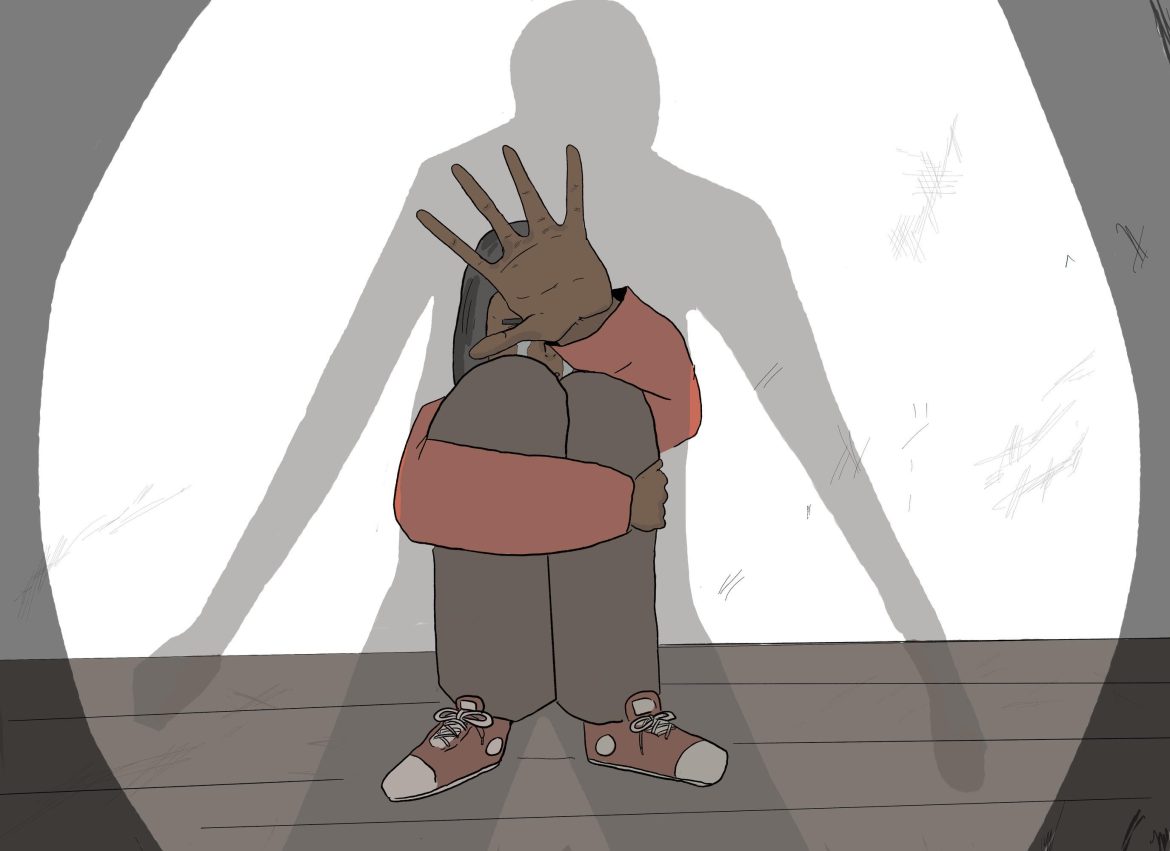A young woman pleads with the ominous figure that shadows her to stop approaching her. Clarke Central High School students have had a limited education regarding the dating violence that continues to rise in America. “To truly take a step towards ending abusive relationships, the CCHS (Family Life and Sexual Health) curriculum must have more extensive domestic violence education built into it – otherwise, students remain at a higher risk,” Viewpoints Staffer Amya Hopkins wrote. Illustration by Sam Harwell
The Athens community has some access to domestic violence services, but at CCHS, the preventative education surrounding the issue must match the reactive support.
Nearly three in 10 women and one in 10 men in the US have experienced physical violence or stalking by a partner, according to the National Domestic Violence Hotline.
Domestic violence, defined by the United States Department of Justice as “a pattern of abusive behavior in any relationship that is used by one partner to gain or maintain power and control over another intimate partner,” continues to be a problem today. Nationally, there are upward trends in intimate partner violence, according to the Bureau of Justice Statistics, which is responsible for measuring crime within the United States.
Despite this uptick, 27 counties in Georgia have no access to domestic violence services, and another 26 counties have very limited access, according to the SAFE Shelter Center for Domestic Violence Service in Savannah, Georgia.
There’s a tragic relationship between these lack of resources and a loss of life – as recently as 2018, SAFE reports that
97 Georgians lost their lives to domestic violence.
Domestic violence is a prevalent and relevant issue today, so Georgians – including those in Athens-Clarke County – need access to domestic violence services and education surrounding the issue. Fortunately, citizens in Athens are lucky to have access to the former.
“Georgians – including those in Athens-Clarke County – need access to domestic violence services and education surrounding the issue.”
Project Safe, a domestic violence support organization based in Athens, works to educate young people on warning signs and provides resources to those who may be experiencing domestic abuse. According to their 2022 Annual Report, Project Safe served 616 survivors through their outreach office, 113 survivors in emergency shelters, and placed 30 survivors in long-term housing – all crucial services for those in need.
These services provided by Project Safe are a laudable and tangible step to mitigating the effects of violent situations. However, when it comes to education, Clarke Central High School is not doing enough to incorporate education surrounding domestic violence situations into its Family Life and Sexual Health (FLASH) curriculum surrounding sex education.
Instead, for the last three years, Project Safe Youth Educator and Advocate Aysha Joyner has been educating students in CCHS’ Women’s Literature class on how to identify violent situations.
“I think it’s important for y’all to have basic education (about) the signs of teen dating violence like the warning signs of an abuser,” Joyner said. “Warning signs of abusers can be things like if they have a history of violence, things like possessiveness.”
Senior Kelbi Phillips, who took Women’s Literature, says the education she received from Joyner encouraged her peers to question some of their ideas about their relationships.
“There were so many girls (in the Women’s Literature class) that didn’t even realize that (the behaviors their partner exhibited) was love bombing or was emotional manipulation,” Phillips said. “So many girls sat there and dissected previous situations or even their current situation (and) they were like, ‘Dang, I didn’t even know that this was a bad thing.’”
Though it’s obviously commendable that Joyner and Project Safe, who gave 53 youth- focused presentations in 2022, are educating
students, CCHS needs to match that initiative for all students. If the students in Women’s Literature hadn’t received that education, as most of the student body does not, those students might not have been able to recognize warning signs until it was too late.
Compared to the rest of Georgia, Athenians have access to some domestic violence services. But, to truly take a step towards ending abusive relationships, the CCHS FLASH curriculum must have more extensive domestic violence education built into it – otherwise, students remain at a higher risk.
